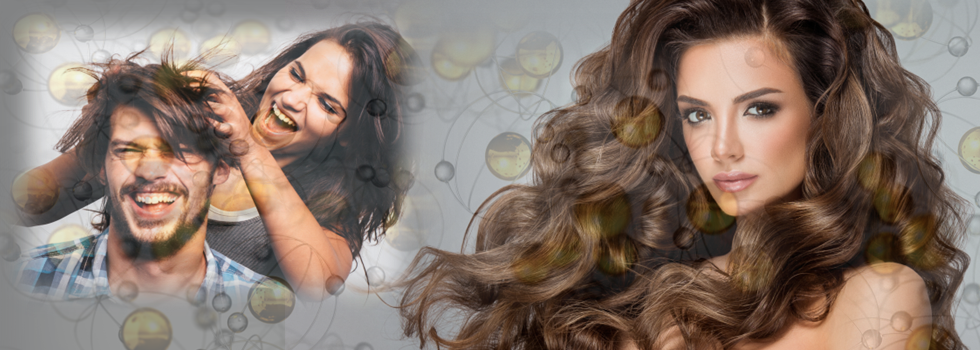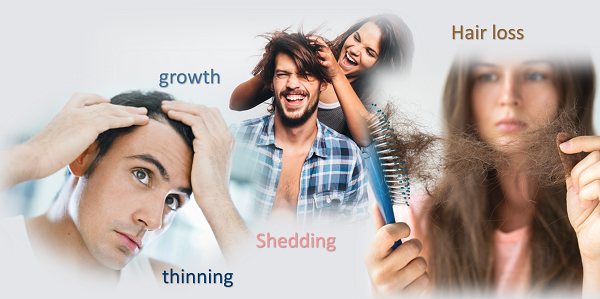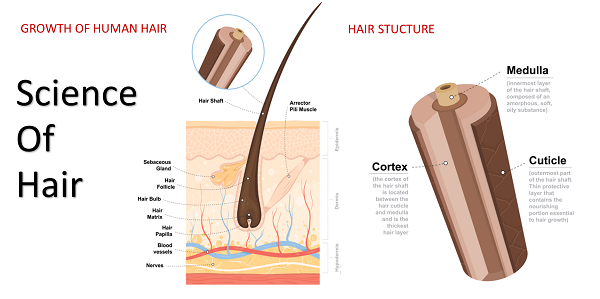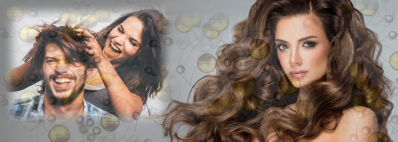Promotional Features
The Age of Hair Growth Supplementation
Hair loss is a common condition experienced by both men and women. From ancient Romans to the current modern generation, having a head full of hair often signifies youth and vitality. Thus, experiencing hair loss can affect one's self-esteem and, in some extreme cases, can be psychologically distressing.
Research shows that several underlying factors that affect overall health can profoundly impact your hair and everyone's combination of causes is different. Sometimes hair loss is a side effect of a health problem that needs to be addressed and will remedy itself when appropriately treated. When hair loss is due to a condition involving the hair itself, as in the case of alopecia, the hair loss can be permanent.
Hair Loss is not bad luck, it can have many causes: stress, excessive cosmetic treatment to the hair, diet, age, hormonal imbalance, autoimmune disease, medication reaction, iron deficiency, and the list goes on. Here are the thirteen most common causes of hair loss.
Androgenetic alopecia
Androgenetic alopecia is another term for male1 or female2 pattern baldness. It is a prevalent cause of hair loss.3 Both male and female pattern baldness are genetic. Males tend to lose hair from the temples and crown of the head. In females, hair usually becomes thinner all over the head. Androgenetic alopecia is more likely to happen as a person ages but can start at any point after puberty. Many females who experience androgenetic alopecia develop it after going through menopause.4 This means that hormones may have something to do with it. There is a possibility of treating this condition with prescription medication for hair growth.
Hair Loss From Thyroid Problems
An underactive thyroid5, a medical condition called hypothyroidism, an overactive thyroid6, or hyperthyroidism, can result in hair loss because each condition causes a hormonal imbalance7. Hormones help regulate nearly every body function, including hair growth. Getting the proper treatment to control either of these thyroid8 conditions will get hormones under control, stop hair loss, and allow your hair to start growing back.
Pregnancy
Some women may experience excessive hair loss shortly after becoming a mom. It takes time after pregnancy for hormone levels to return to normal, so it's not uncommon for post-partum moms to notice thinning hair or even patches of baldness. This often occurs about three months after birth. This is due to a decrease in estrogen9 levels. This type of hair loss is a temporary condition and usually resolves within a year or sooner.
Telogen effluvium
Telogen effluvium10 is a condition where the hair remains in the growth cycle's telogen (natural shedding) phase. This causes more hair to fall out, sometimes in handfuls. Telogen effluvium is usually a temporary condition that resolves over time. It is advisable to see a doctor to find out the cause.
Hair Loss Due to Medications
Hair loss can be a side effect of several medications for everyday health problems. Blood-thinning medications, some oral contraceptives11, antidepressants12, NSAIDs13, Accutane, used to treat acne14, and beta and calcium channel blockers15 can all lead to thinning hair or baldness.
Anagen effluvium
Anagen effluvium16 causes large amounts of hair to fall out rapidly during the anagen (growth) phase of the hair cycle. The condition may cause hair to fall out from the head and other parts of the body, including eyebrows and eyelashes.
Causes of anagen effluvium include:
- chemotherapy
- radiation
- fungal infections17
- autoimmune disease18
If a person has anagen effluvium because of undergoing chemotherapy19, cooling the scalp during the procedure may help. Hair will often start growing back within 3–6 months after stopping the chemotherapy.
Alopecia areata
Alopecia areata20 is an autoimmune condition that causes hair to fall out suddenly. The immune system attacks hair follicles, along with other healthy parts of the body. Hair from the scalp, as well as eyebrows and eyelashes, may fall out in small chunks.
Traction alopecia
Traction alopecia21 is hair loss due to pulling hair into tight hairstyles, which causes it to break and come loose. Hairstyles associated with this condition include:
- tight buns or ponytails
- braids
- cornrows
- extensions
If traction alopecia continues, a person may develop bald spots and thinning of the hair.
Ringworm
Ringworm22 is a fungal infection that can cause hair loss. Ringworm on the scalp, or tinea capitis23, can cause temporary bald areas on the head.
Symptoms include:
- a small spot that gets bigger, causing scaly, bald patches of skin
- brittle hair that breaks easily
- itchy, red patches of skin in the affected areas
- oozing blisters on the scalp
- ring-like patches, with a red outside and the inside of the circle matching the skin tone
If ringworm does not heal by itself, a doctor may prescribe an antifungal medicine. Alternatively, they may prescribe an antibiotic, such as Griseofulvin.
Physical Trauma: A Shock to Hair Follicles
When your body is under severe physical stress, the natural cycle of hair growth and resting can be disrupted, resulting in hair loss, often in thinning hair24 — strands may come out in clumps. Any shock to the system, such as being in a severe accident, undergoing surgery, experiencing burns, or becoming very ill, can also shock the hair follicles, resulting in up to 75 percent of your hair falling out, sometimes months after the fact.
Emotional Stress
When dealing with a life-altering event, like a divorce or break-up, bankruptcy or other financial problems, the loss of a home, or the death of a loved one, significant emotional stress can also disrupt the normal hair growth cycle. Significant emotional stressors can cause temporary hair loss, but normal hair growth is usually restored once the stress is brought under control.
Extreme Hair Care
Excessive cosmetic treatment to the hair can cause significant damage and breakage to strands, which could result in hair loss and thinning hair. Shampooing or blow-drying too frequently, repeatedly using heated styling tools, pulling on hair — whether from blow-drying it or styling it in a too-tight ponytail, for instance — or too vigorously rubbing the scalp can all lead to hair loss.
Nutritional Deficiencies
Nutritional deficiencies can cause hair to fall out. Extreme diets that are too low in protein and specific vitamins, such as iron, can sometimes cause excessive hair shedding. Too much vitamin A and vitamin A-based drugs called retinoids can also cause hair loss. A person should see a doctor for a blood test to check if they have a nutritional deficiency that could be causing their hair to fall out. Vitamin D deficiency has been linked to alopecia and several other health conditions. Research25 shows that a lack of vitamin D in your body can lead to hair loss. One role vitamin D plays in stimulating new and old hair follicles. New hair growth can be stunted when there isn't enough vitamin D in your system.
Addressing the deficiency in the room
Unfortunately, in the past, many people who experience temporary and permanent hair loss have resorted to expensive surgeries, drugs, and chemical procedures that may pose side or long-term effects. With technology allowing consumers to make more informed decisions, there is a growing demand in the natural products market for clinically backed ingredients to combat hair loss and maintain good hair/scalp health.
Consumers are looking for hair-care brands that promote natural ingredients in their products and fewer sulfates, parabens, and alcohol, as these are known to strip the hair of their natural oils, causing brittleness and itchy scalp. Black cumin oil, biotin, keratin, buckthorn oil, collagen, and amino acid are some popular ingredients used by brands to stimulate hair growth. Micronutrients, such as vitamins and minerals, play an important, but it is not entirely clear the role they may play in normal hair follicle development.26 Vitamin C intake is crucial in patients with hair loss associated with iron deficiency. A few studies address the relationship between hair loss and folic acid or vitamin B12, but the lack of extensive studies precludes any recommendation for vitamin B12 or folate screening or supplementation.26
Dermatologists also often recommend medications such as topical minoxidil and oral finasteride for male pattern baldness and androgenetic alopecia. While these medications are known to stop hair from thinning and stimulate new hair growth, they are often associated with side effects and might not be suitable for women.
A new alternative for hair health
HairAge-Vitae is the newest addition to Gencor's growing portfolio. This patented, branded ingredient portfolio is an herbal extract of Ageratum conyzoides clinically proven to reduce hair fall and increase hair growth. Ageratum conyzoides, also known as Billy goat Weed, is a tropical plant with a good safety profile known for its antimicrobial, anti-inflammatory, and antioxidant properties.
A recent study was published in the Journal of Cosmetology and Trichology27, assessing hair loss formulation as an effective treatment option.
A 12-week double-blind, randomized clinical trial was conducted on 80 healthy male and female adults who self-reported hair loss. The participants were given daily doses of 0.5% concentration of Ageratum conyzoides topical gel over 12 weeks, and the study found a significant increase in hair density and a decrease in hair loss ratio. The exceptional results from this study confirmed the safety and efficacy of a topical application of Ageratum conyzoides for hair loss treatment. The ingredient is so versatile that it can be incorporated into various applications such as shampoo, conditioner, hair serum or gel, and topical cream. Finally, HairAge Vitae has extensive safety data and has no toxicity reported in clinical trials.
------
References:
1. https://www.medicalnewstoday.com/articles/68077
2. https://www.medicalnewstoday.com/articles/321527
3. https://ghr.nlm.nih.gov/condition/androgenetic-alopecia#:~:targetText=Androgenetic%20alopecia%20is%20a%20common,a%20characteristic%20%22M%22%20shape.
4. https://www.aad.org/public/diseases/hair-loss/types/female-pattern
5. https://www.everydayhealth.com/thyroid-conditions/hypothyroidism/warning-signs-symptoms-hypothyroidism/
6. https://www.everydayhealth.com/hyperthyroidism/guide/
7. https://www.everydayhealth.com/hormones/guide/
8. https://www.everydayhealth.com/thyroid/guide/
9. https://www.medicalnewstoday.com/articles/277177.php
10. https://www.medicalnewstoday.com/articles/321590.php
11. https://www.everydayhealth.com/hair-loss/oral-contraceptives-as-a-hair-loss-treatment.aspx
12. https://www.everydayhealth.com/depression/guide/medications/
13. https://www.everydayhealth.com/nsaid/guide/
14. https://www.medicalnewstoday.com/articles/107146.php
15. https://www.everydayhealth.com/calcium-channel-blocker/guide/
16. https://www.medicalnewstoday.com/releases/73225.php
17. https://www.medicalnewstoday.com/articles/317970.php
18. https://www.medicalnewstoday.com/articles/311852.php
19. https://www.medicalnewstoday.com/articles/158401.php
20. https://www.medicalnewstoday.com/articles/70956.php
21. https://www.medicalnewstoday.com/articles/320648.php
22. https://www.medicalnewstoday.com/articles/158004.php
23. https://www.medicalnewstoday.com/articles/326665.php
24. https://www.everydayhealth.com/hair-loss-pictures/ways-to-grow-healthy-hair-0209.aspx
25. http://www.ncbi.nlm.nih.gov/pubmed/20178699
26. https://www.ncbi.nlm.nih.gov/pmc/articles/PMC6380979/
27. https://www.hilarispublisher.com/open-access/efficacy-of-a-topical-application-of-ageratum-conyzoides-on-increasing-hair-growth-and-in-males-and-females-a-randomised.pdf




